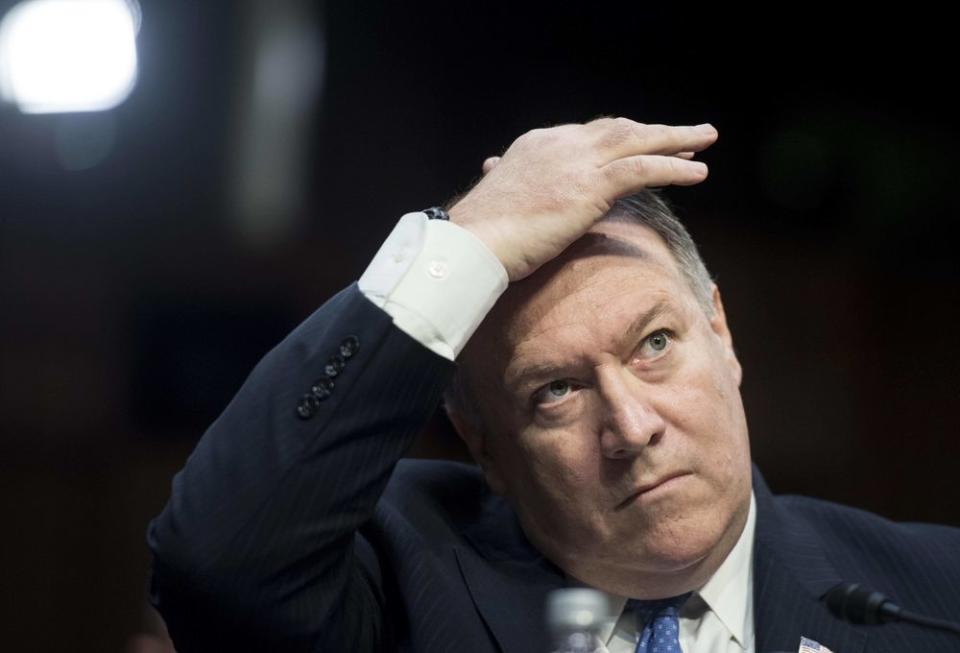Commentary: With Tillerson Out, Trump’s Bringing Foreign Policy Deeper Into the Dark Side
The gloves are off at the White House now that Mike Pompeo is slated to replace Rex Tillerson as secretary of state.
Without whatever restraining influence the outgoing Tillerson had on the president—and, frankly, it was minimal—Donald Trump is now about to veer headlong into the “dark side” of foreign policy, much as the George W. Bush administration did after September 11.
When Trump appointed Tillerson to head up the State Department, the Washington foreign policy elite didn’t quite know what to make of the former ExxonMobil CEO. Although Tillerson lacked formal diplomatic experience, he at least seemed to be a reasonable fellow, unlike some of the fire-and-brimstone choices that Trump was considering, like former United Nations Ambassador John Bolton.
Indeed, Tillerson quickly acquired the status of one of the “adults in the room” that could temper the excesses of his volatile boss. Tillerson was not a climate-change denier. He believed in the value of treaties like the Iran nuclear deal. He seemed to take diplomacy seriously.
It was precisely these qualities that put him on a collision course with the president—and earned him a reputation for fecklessness.
The secretary of state couldn’t prevent the U.S. withdrawal from the Paris climate deal. His attempts to reach out diplomatically to North Korea earned him a public scolding from Trump. And rumors of Tillerson’s own dismissive comments about the president (famously calling him a “fucking moron”) suggested that Tillerson had difficulty getting used to Trump’s ignorance about international affairs and sheer managerial incompetence.
But Tillerson wasn’t just a thorn in Trump’s side. For instance, the secretary of state dutifully fulfilled his presidential mandate to destroy the very institution he was appointed to run.
At State, Tillerson presided over the hemorrhaging of staff, the failure to fill scores of high-ranking vacancies, and a radical reduction in future budgets. He deemphasized human rights and democracy as key elements of the State Department’s mission. He stood beside the president as Trump undermined responsible U.S. engagement with the world and then watched, tight-lipped, as U.S. global standing declined accordingly.
Trump wrung what he needed out of Tillerson and then discarded him. The secretary of state resembles one of those token liberals that communist governments appointed in Eastern Europe just after World War II to give the impression that their countries were technically (and temporarily) democracies.

Pompeo, on his way from the CIA to State, is no figurehead. He has considerably more experience in international relations and national security than Tillerson did, and that’s what makes him so dangerous.
The incoming secretary of state’s views align with the most extreme global vision of Donald Trump. Pompeo’s Islamophobia is even more toxic than the president’s. As a Kansas congressman, Pompeo received more Koch brothers money than any of his colleagues did, which reinforced his virulent climate change denial.
Pompeo is also a hawk’s hawk. He supports regime change in North Korea. He will push Trump to tear up the Iran nuclear deal. He has taken hardline positions against China and Russia. The only thing that separates Pompeo from the notoriously bombastic Bolton is that the CIA chief prefers a quieter approach to over-the-top speeches.
In this way, Pompeo is like former Vice President Dick Cheney, who was responsible for the most illiberal detours the Bush administration took after September 11. Like Cheney, Pompeo will be well positioned to work behind the scenes to militarize foreign policy and resurrect a counterterrorism policy that flouts international law. He will be aided in that endeavor by the nominee to replace him at CIA, Gina Haspel, who ran a CIA black site and destroyed evidence of the torture that took place there.
The sex scandals, the wild tweets, the corruption: Any of these media sensations might have sunk earlier presidencies. But they are just distractions. The shell game that will deposit Pompeo at State, raise up Haspel at CIA, and even possibly bring in Bolton to replace H.R. McMaster as the national security adviser deserves far more attention.
Trump started out his administration with radical outsiders like Steve Bannon and ineffectual managerial types like Tillerson. A new wave of competent extremists like Pompeo are now poised to take American democracy further into the dark side than even Cheney was willing to go.
John Feffer directs the Foreign Policy In Focus project at the Institute for Policy Studies. He’s the author of books on Eastern Europe, Islamophobia, and North Korea, as well as the dystopian novel Splinterlands.

